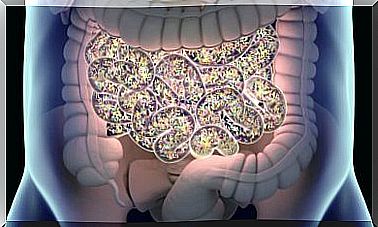Everything You Need To Know About Aerophagia
Aerophagia is a physiological phenomenon produced by excessive intake of air in the digestive tract, especially during meals. The term literally means “eating of the air.” It is a minor digestive disorder, but one that involves discomfort.
It is often responsible for the top air vent, commonly known as burping. It should not be confused with gastroesophageal reflux, which has similar symptoms.
As scientific evidence indicates, aerophagia can be aggravated in the presence of other pathologies, such as dyspepsia, or abdominal swelling. In children, aerophagia is relatively common and has been linked to infant colic.
What are the causes of aerophagia?
Typically, aerophagia is the result of an inadequate diet. It is usually related to excessive consumption of carbonated and sugary drinks or certain foods, such as sweets, breadcrumbs or chewing gum.

It can even be caused by bad eating habits, such as eating too fast. This encourages the entry of a large amount of air into the digestive tract.
It can also occur due to anxiety problems, such as stress. From a pathological perspective, it is common in people who do not properly coordinate the functions of swallowing and breathing. Which occurs frequently in people with mental pathologies.
What symptoms does it cause?
Aerophagia is manifested by a feeling of stomach heaviness, a feeling of bloating, and digestive problems. Burping, along with flatulence, is the way to ease digestion discomfort.
Among the symptoms of aerofagia include:
- Abdominal bloating: caused by the pressure of gases. Excess air causes the abdomen to be swollen. However, it can be confused with other symptoms.
- Abdominal pain : Sometimes the pain is transferred to the lower area of the sternum by pressing the air to both the stomach and the heart. The pain can be confused with that caused by angina pectoris.
- Intestinal noises : There are conditions that produce the symptoms of aerophagia. This is the case of gases that, in addition, give rise to noises in the intestine.
- Belching and odorless meteorism.
Which is the diagnosis?
The diagnosis is made when belching is repetitive and bothersome, at least several times a week. In addition, the amount of air that is swallowed is checked.
The fundamental thing in the diagnosis is to rule out organic pathologies such as diseases of the upper digestive tract, carbohydrate malabsorption, bacterial overgrowth and motility alterations, among others.
Can it be prevented?
To prevent aerophagia, it is advisable to maintain a proper diet, chew slowly and avoid certain foods that promote inflammation, such as soft drinks, sweets or chewing gum, among others.
If the swelling is due to stress, try to alleviate the anxiety with appropriate treatment or reduce it with regular sports and relaxation. The symptoms of aerophagia usually disappear spontaneously once the causes responsible for the disorder are treated.
Do you have treatment?

Treatment comprises a variety of measures to take into account:
- Chew well and slowly: many people eat excessively, poorly and quickly. This causes weight gain problems and also poor digestion. So one of the things to do to avoid and treat aerophagia is to eat and chew food more slowly.
- Avoid large meals : a healthy diet helps prevent aerophagia. It is advisable not to eat copious, very spicy meals or drink carbonated drinks.
- Relax: there are people who retain the nerves in the stomach. In this case, you have to release stress, leading a healthier life in general. For this it is good to exercise regularly and eat more fruit, fish and vegetables.
- Take chamomile and other natural remedies: Certain natural products can alleviate some of the symptoms of aerophagia. Chamomile is the perfect natural remedy to treat and relieve gas.
- Drink water: it allows us better hydration. In addition, with the intake of water, the consumption of carbonated beverages that are not recommended is avoided.
On the other hand, performing an abdominal massage can help alleviate this digestive system disorder that is sometimes so annoying.









